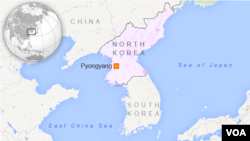International sanctions have contributed to the worsening of human rights in North Korea, according to the nongovernmental group Human Rights Watch, while the U.S. State Department, which supports the sanctions, said the regime is mainly to blame.
The rights organization said United Nations sanctions imposed on North Korea in 2016 and 2017 have "disrupted general cross-border trade" with China and reduced the ability of people to conduct informal market activities to sustain their livelihoods. The government-approved, quasi-private markets have been operating in North Korea since the late 1990s.
The country's draconian COVID-19 restrictions instituted in early 2020 aggravated conditions, said Human Rights Watch (HRW) in a report published on March 7.
The report, "A Sense of Terror Stronger than a Bullet," said the U.S. should "take active steps to counteract sanctions 'overcompliance' by financial institutions and other actors, [which are] blocking legitimate and non-sanctioned transactions and humanitarian operations."
In response, a spokesperson for the State Department said, "The government of the DPRK bears ultimate responsibility for the suffering of its people, as it is choosing to divert scarce resources from humanitarian and economic needs towards its unlawful WMD [weapons of mass destruction] and ballistic missile program." The spokesperson used the acronym for North Korea's official name, the Democratic People's Republic of Korea.
The spokesperson added in an email to VOA's Korean Service on March 13: "We continue to support international efforts to provide critical humanitarian aid to the DPRK. We hope that the DPRK will soon open its borders to international humanitarian workers, whose aid efforts have been hindered by the DPRK's border closures."
VOA contacted the North Korea mission at the United Nations for responses to the HRW report and the State Department comment but did not receive a reply.
North Korea has not allowed international aid workers into the country since they left more than three years ago when the regime rolled out pandemic measures. But earlier this year, Pyongyang permitted some foreign countries to reestablish their diplomatic presence in the country.
History of abuse
North Korea has a long record of systemically violating the human rights of its people including the use of torture, execution without fair trials and arbitrary detention, in addition to the denial of freedom of speech, religion, press and assembly, according to the United Nations.
Residents obtain their necessities, including food, from informal markets called jangmadang. These emerged after the former Soviet Union fell and no longer provided aid to the country. North Korea's socialist regime then cut off rations, its economy collapsed, and it entered a great famine.
Most of the goods sold and bought at the markets are brought in from China, the largest trading partner of North Korea. The HRW report said the sanctions the U.N. Security Council passed in 2016 and 2017 reduced people's ability to buy "already-limited food, medicines, and necessities" from these markets.
Beijing enforced the sanctions at the time and instituted "new border restrictions" that impeded trade, according to the report.
Greg Scarlatoiu, executive director of the Committee for Human Rights in North Korea, said Friday in an email to VOA, "North Korean sanctions do not target the people of North Korea."
He said U.N. sanctions were passed to prevent North Korea from developing and proliferating its nuclear weapons and ballistic missiles, and to punish the North Korean elite in charge of those activities by ending their ability to make hard currency from abroad by exporting items the sanctions banned.
The sweeping sanctions that were passed in 2016 and 2017 banned North Korean exports of seafood, textiles, agricultural products and minerals such as coal and iron.
The restrictions were put in place in response to North Korea's fifth and sixth nuclear tests and the launch of ballistic missiles, including Hwasong-14 and -15 intercontinental ballistic missiles (ICBM).
Scarlatoiu said there could be "unintended negative side effects of sanctions possibly affecting the human security of North Koreans," but it is "impossible" to make that determination without conducting a "fact-finding mission inside the country."
Report based on interviews, images
The HRW report says its findings are based on interviews with former North Korean traders, defectors with relatives still in the country, former North Korean government officials, journalists and activists with contacts inside the country and in China.
The report says it also bases its assessments on satellite images of North Korea's northern border, heavily fortified since early 2020.
Marcus Noland, executive vice president and director of studies at the Peterson Institute for International Economics, told VOA on Friday via email that sanctions are not the primary problem with North Korea's economy.
"The government's self-isolation in response to the pandemic greatly reinforced the underlying problems," he said.
At the same time, sanctions adversely affected North Korean people's economic livelihood as some financial institutions are "uninterested" in making relatively small transactions that could expose them to legal risks, added Noland, who has written extensively on the North Korean economy.














